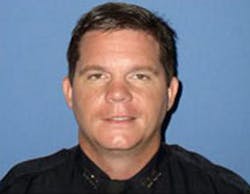Trial of Man Accused of Killing Fla. Officer Begins
TAMPA, Fla. -- The flashing lights of police cruisers and officers' flashlights pierced the night as they went looking for a homeless man in dreadlocks, dressed in black, who had shot one of their own.
Tampa Police Cpl. Mike Roberts was wearing his bulletproof vest but a round had found an opening beneath his armpit.
Roberts' fellow officers found him down and bleeding at the corner of Nebraska Avenue and East Arctic Street on Aug. 19, 2009. He died later that night at a hospital. The bullet had pierced his heart and lungs.
Witnesses described the apparently homeless man who had shot Roberts. A suspect was found crouched behind a woodpile in a nearby yard, a pistol in his pocket and an assault rifle at his feet, police say. A probe from Roberts' Taser stun gun still dangled from the man's hair.
Humberto Delgado goes on trial Monday, accused of killing Roberts. He faces the death penalty if convicted.
Delgado's attorneys aren't contesting he was the killer. Instead, in an effort to save his life, they are arguing he was insane.
The trial is expected to play out during the next three weeks.
First, a 12-person jury, along with at least 3 alternate jurors, must be selected. That could be a lengthy process as prosecutors and defense attorneys probe prospective jurors on their views about the death penalty and their willingness to impose it or a life sentence.
In July, the last time a defendant faced the death penalty in a Hillsborough County courtroom, the prospective jury pool was exhausted before a panel could be seated.
In that instance the judge and attorneys began with 60 potential jurors. After four days they had enough for the 12 jurors but not for the required alternates.
In the Delgado case, Circuit Judge Emmett Lamar Battles and the respective attorneys will start with 150 potential jurors, with 50 more in reserve.
To accommodate that number of people Battles is abandoning his usual fifth-floor courtroom and holding the jury selection procedure in a ceremonial courtroom normally used for massive civil trials. The trial itself will take place in Battles' usual courtroom.
Battles has said he will stop the jury-selection process by 4 p.m. today to ensure no one will have to abandon trick or treating with their children, or whatever Halloween plans they might have.
The last time a Hillsborough County judge imposed a death sentence was in November 2007.
The last time a county jury considered the possibility was in September 2009 when the panel recommended a life sentence without parole for Derrick McNeal, who was convicted of killing running over his ex-girlfriend's 2-year-old daughter.
In pretrial hearings during the past two weeks, Delgado's defense team already has offered a preview of its strategy.
Delgado, a former police officer and U.S. Army private, told mental health officials he had been persecuted, even tortured, by a Masonic conspiracy. He said he believed Cpl. Roberts was part of it.
Roberts stopped Delgado while he was pushing a grocery cart through a neighborhood where there had been a rash of break-ins.
Delgado told his evaluators he had cleaned out his storage locker in Largo and was heading toward the James A. Haley Veterans Administration Center, hoping to get help.
Among his possessions were a laptop that caught Roberts' eye, and pistols and the rifle.
Delgado said he blacked out, though witnesses that night said Delgado asked for their help and said the police were trying to kill him.
When cornered at the wood pile, officers said Delgado yelled, "I'm sorry" and "I'm crazy."
The defense psychiatrists and psychologists said Delgado is bipolar with psychotic features; suffering from paranoia and hallucinations. They said he had two court-ordered commitments in the Virgin Islands. But they say he knew the difference between right and wrong.
How much jurors will hear of Delgado's version of what happened that night remains unclear.
Prosecutors have objected to mental health officials recounting what Delgado told them about the confrontation with Roberts, saying it would be like allowing Delgado to testify -- without them being able to cross-examine him.
Defense lawyers counter that such mental health experts should be allowed to tell jurors what factors led to their diagnosis.
Battles said he will meet with attorneys outside earshot of the jury when each expert is called, to determine what the expert can relate of Delgado's recollections.
The judge did rule that the defense will not be allowed to use a controversial brain-mapping test in an effort to show Delgado had brain damage that limited his ability to control his impulses and lead to other psychological problems.
Copyright 2011 - Tampa Tribune, Fla.
McClatchy-Tribune News Service
